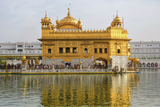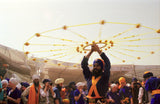In a BBC Survey, Sher-e-Punjab Maharaja Ranjit Singh was Named The World's Greatest Leader
Maharaja Ranjit Singh, known as the Lion of Punjab, came in first, followed by Amilcar Cabral, a freedom warrior; Winston Churchill, Britain's Prime Minister, came third place; Abraham Lincoln, the 16th President of the United States, placed fourth and; last but not least, Britain's sole female leader, Queen Elizabeth I.
BBC World History Magazine, entitled “Who is the world’s greatest leader of history?” issued in March-April 2020, featured the poll “Who is the world’s greatest leader?”. Twenty leaders who reigned with bravery, patience, wisdom, and insight were nominated in this survey.
Sher-e-Punjab Maharaja Ranjit Singh Won The World’s Best Leader Title

Photo courtesy of Dr. Raghbir Singh Bains
More than 5,000 readers participated in the poll, and Sher-e-Punjab Maharaja Ranjit Singh ultimately received more than 38% of the votes, making him the world's best leader and great pride for Punjab. The exceptional work of Maharaja Ranjit Singh's leadership, superior administration, secularism, popularity, the welfare of the people, and the creation of a contemporary empire led to his election as the greatest ruler in the annals of global history.
The survey's nominee for Maharaja Ranjit Singh was British historian Matthew H. Lockwood. King William III of Great Britain, Emperor Wu Zetian of China, Empress Catherine the Great of Russia, Empress Blanche of Castile of France, and many others were conquered by Maharaja Ranjit Singh.
Amclar Cabral, A Nationalist and Pan-Africanist Revolutionary, Came in Second

Photo Courtesy: Global Afrikan People’s Parliament
With 25% of the vote, renowned Pan-Africanist Revolutionary hero Amlcar Cabral came in second. Cabral fought a protracted battle to free Guinea from Portuguese rule. He led more than a million Guineans in the fight against Portugal for independence, winning it. Guided by his struggle, the African nation struggled and liberated itself from other Portuguese colonies. On September 12, 1924, he was born into a humble family in the Guinean village of Bafta. In the capital of Portugal, he attended college. He was highly impacted by European culture while he was a resident of Portugal. He organized Guineans and started the fight for independence after finishing his studies and returning home. Portuguese operatives assassinated Cabral just eight months before independence. Therefore he did not live to see Guinea's 1973 declaration of independence. Because of his excellent work, he is well-regarded in Guinea.
Winston Churchill, the UK’s Former Prime Minister, Went Third Place

Photo Courtesy: Historic UK
The United Kingdom's former prime minister, Winston Churchill, went third place with 7% of the vote. He was a Royal Family member born in Oxford, England, on November 30, 1874. His astute political acumen kept Britain in World War II, and his clear political choices during the conflict led to Britain's stunning triumph. As a result, his political abilities were hotly debated. Winston Churchill served as British Prime Minister (1940-45 & 1951-55). He was an army officer, politician, and talented writer. On several of his campaigns, he also published books. Churchill was a well-known author for which he was awarded the Nobel Prize in Literature in 1953. He was also exceptional because he refused to accept the capitulation deal that was negotiated under the terms of German Chancellor Adolf Hitler. After a lengthy political career, he passed away in 1965 due to a heart attack.
Abraham Lincoln, the 16th President of the US, Placed Fourth

Photo Courtesy: History.com
Abraham Lincoln, the sixteenth President of the United States, came in fourth on the survey (1861-65). On February 12, 1809, he was born into a low-income household. Since he was a little boy, Lincoln has been an avid reader and writer. Despite living in poverty, he kept his interest burning and persevered to become a great lawyer. From a young age, Lincoln opposed African slavery vehemently and wanted to run for politics to put an end to it. He was elected as President of the USA in 1861. A Civil War started between the northern and southern states of the United States that lasted for a full four years, in which North America prevailed. In this Civil War, millions of people suffered injuries, and over six lakh died. Slavery was abolished as a result, and all states decided to continue being a part of one union. Abraham Lincoln died on April 14, 1865, when he was assassinated while watching the Fort Theater Play in Washington, DC. Commemorating his death and giving honor to his works to protect the country during the war, abolish slavery, and bring the country together, a 60-foot-tall statue of Abraham Lincoln was erected on Mount Rushmore in the United States.
Queen Elizabeth I of England, as Fifth World’s Greatest Leader Poll and Top-Ranking Woman Leader

Photo Courtesy: Historic UK
Queen Elizabeth I of England was the top-ranking woman on the list at the fifth position, with 4% of the vote. By repressing the Spanish powers, Queen Elizabeth I brought peace to England and built the foundations of a powerful kingdom. The final of England's Hosh of Tudor's five rulers, Queen Elizabeth overcame much opposition and effort to become the monarch of England. Elizabeth spoke many languages. She developed her public speaking skills and became fluent in English, French, Latin, and Italian. Elizabeth was referred to be the "Virgin Queen" across all of England, but when the English Parliament compelled her to wed in 1566, she responded by declaring that she had already united her kingdom and had no desire to marry a man again. The queen had never been married and had kept her vow. Some European explorers found a colony on the North American shore during the queen's rule, who gave it the name "Virginia" in honor of the monarch. She was the final member of the Tudor family. Elizabeth's cousin Mary, whose family the Stuart dynasty sprang from, was the heir to Elizabeth after her death in 1603, becoming James VI of Scotland.
Other Leaders Who Have Remarkable Accomplishments
In addition to the top five world leaders, the study featured additional rulers who have accomplished remarkable things throughout their reigns. They are the Mughal Emperor Akbar, Alfred the Great, who ruled Wessex, Queen Catherine of Russia, Mansa Musa, who ruled Mali, and Innocent III, a monk who created a detailed map of all of Europe, St. Anthony who aided the mathematician revolution, Blanche of Castile, the queen of France, Amenhotep III, an ancient Egyptian pharaoh, Isabella of Castile, the monarch of Castile, Oda Nobunaga, a 16th-century Japanese warlord who was successful in unifying Japan, Oliver Cromwell, the Lord of England, Scotland, and Ireland, Biodica, the first queen of the Iceni in the first century, William III, the king of England, Scotland, and Ireland who freed Europe from France, Wu Zetian, the ruler of China and the most powerful woman in history, and Joan of Arc, the head of the French military.



